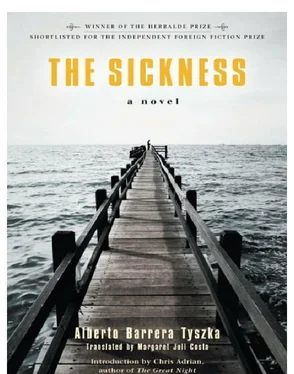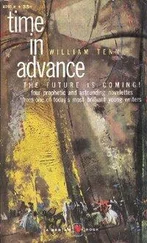Alberto Barrera Tyszka
The Sickness
“Driven by an urgent narrative pulse and a great fluency of style. . [ The Sickness ] will touch the heart of many readers for its sensitive and balanced exposition of the fundamental problems of the human condition.”
— ANGEL BASANTA, El Mundo
“Tyszka is a perceptive, original writer. He has brought an unusually sophisticated understanding to a wonderfully intense, little novel. No sentimentality, no polemic, just emotion at its most resonant.”
— EILEEN BATTERSBY, Irish Times
“A delicate piece of craftsmanship. . A small great work.”
— JUAN CARLOS PALMA, Mercurio
“This is a short, tersely written novel that distances and invades us at the same time. Powerful themes and powerful writing [that do] not let you off or let you down.”
— SUSAN HILL, author of The Woman in Black
I was afraid to read this book.
My father died after a course of illness very similar to Javier Miranda’s when I was just finishing my training as a pediatrician. It was an experience that I am reluctant to relive, if I can help it. The premise of The Sickness is made quite obvious on the back cover, and you don’t have to read more than a page or two to realize that Alberto Barrera Tyszka writes powerfully affecting prose and is unlikely to pull any punches, either by design or accident, as he escorts his reader through the nightmare emotional and physical landscapes inhabited by very sick people and the people who love them. This is a great book by a great writer , I thought after only a few pages. But I wanted to put it in a lead box and forget about it.
I did set it aside for a long time, but I could not forget about it, and I spirited it away from its containment more and more frequently, for longer and longer stretches, feeling somehow as if I were peeking through my fingers at the words. Eventually, I dropped my hands from my mind’s eye, gave myself over to Tyszka, and finished the novel. Then I read it again in a single sitting.
I could not resist this story or avoid it for the same reasons I have never been able to fully resist or avoid the story of my father’s illness: the fundamental gravities of guilt and regret and grief are inescapable while we are alive. They lock us into orbits that can look a lot like our old lives — the ones we lived before the sickness or the accident, before the death — but aren’t the same. Much more importantly, I could not resist this story because it illustrates — perhaps it’s more accurate to say it contains —a set of energies that work in opposition to guilt, regret, and grief. That is to say, I thought this was going to be one of the most depressing books I have ever read, but it was exactly the opposite.
That’s not to say it isn’t a sad book, or a brutal one — it’s both. But it travels into dark, sad, brutal places and brings back the report that life is very much worth living because people are very much worth loving. This is the news that sickness itself sometimes brings, to the sick person, to his or her lovers and families and caretakers, often in a way that feels too late: the sick and dying person discovers or remembers too late whom they loved or who loved them. The Sickness reminds us that it is both always and never too late to discover or remember such things: if health is rendered into a state of waiting for sickness to manifest, then we all, sick and healthy alike, are given a mandate to grasp at everything and everyone precious in life. That’s why this book is the very opposite of depressing. Depression maintains very convincingly that everything — every person and every experience — is worthless and without meaning. Its opposite convinces you that everything and everyone matters — that you matter, that your life and the people in it matter.
I am a congenitally dispirited person. When trying to describe my usual spiritual and emotional torpor, I’ll sometimes ask people to imagine a cruel experiment in which Christopher Robin’s dysthymic donkey friend Eeyore is forced to watch twelve consecutive episodes of Law and Order: SVU and then made to eat a quaalude. I tell you this now to try to make you understand that I am not a person ordinarily susceptible to attempts — by priests, poets, therapists, or social workers, by movies or music or books, by Smurfs or unicorns or drag queens — to convince me that everything is actually all right, that life is good, that people are worth the various risks of knowing and loving them.
But this book convinced me of all those things — the goodness of life, the worthiness of people, the ultimate value of communication — without even appearing to try. If it had appeared to try to make such an argument, to say directly such things as Other people can help you in your suffering or You can help them in theirs , I would have balked. But then, we all should probably resist when such things are merely said. These are just platitudes, empty forms that can inspire rage and resentment in the suffering or doubtful person to whom they’re addressed. You cannot say such things to me , I think, in a way that is barely articulated or acknowledged but very powerfully felt, whenever I hear someone state that people suffer for a reason, that illness and grief make us stronger, or — worst of all — that it’s all part of some plan, that our own and others’ suffering is a thing we’ll understand one day as having been necessary. You can’t say such things to me, I think, because I am a congenitally dispirited person genetically protected from sunny platitudes, or because I am a pediatric oncologist, or because Eeyore is my mascot. But really you can’t say these things to me for the same reason that you can’t say them to anyone: I’m a human being, and I know better.
The Sickness does not offer up platitudes. It destroys them. Yet it provides a reassurance that is believable and real, and it is believable and real because it is not spoken but shown, because we are invited and compelled to live it within the story. We may very well suffer for no reason, and gain no strength from our troubles except the final invulnerability of oblivion; the best we may ever do one day to understand our suffering is to try to forget about it; there may be no plans to our lives except for retroactive fictions— The Sickness does not deny any of this. It may even insist upon it all. But in writing so honestly about illness and suffering, Tyszka throws a light on everything that is not sickness or suffering — the sickness illuminates its own remedy, which has nothing necessarily to do with modern medicine. This is a book that is ultimately about whether or not we are all alone — in our lives, in our suffering, in this world. And it is a book that ultimately makes us less alone, something for which we should all be very grateful to the author. You should read this book if you are congenitally dispirited, like me. But you should also read this book if you are congenitally full of good spirits, if you have never been sick or felt afflicted by the universe, if you have never loved someone who was ill, who suffered, who died. Even if bouncy Tigger is your mascot and spirit guide, you should read it, because one day we are all going to need to have heard its message, and to try to remember it.
— CHRIS ADRIAN
“Are the results in yet?”
No sooner are the words out of his mouth than he regrets having spoken them. Andrés Miranda wishes he could catch the question in midair and send it back where it came from, hide it away again beneath a silence. But he can’t, it’s too late. Now all Andrés has is the chief radiologist’s face, his lips a knot in the middle of his mouth, his dark eyes like two stains, as he offers Andrés a smile of strained sympathy and hands him a large brown envelope. The radiologist says nothing, but his very expression is a judgment: multiple lesions suggestive of a metastatic disease, for example. That, more or less, is what the knotted lips are saying. Medical people rarely use adjectives. They don’t need to.
Читать дальше












